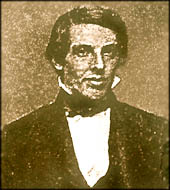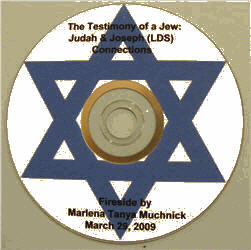_(english).jpg) The United States was the first country to be created, from its inception, as a democracy. And the Bible played a major role in the process.The creation of the United States of America represented a unique event in world history. Unlike other countries where democracy evolved over a period of hundreds of years, the United States was the first country to be created, from its inception, as a democracy. And the Bible -- and Jewish values -- played a major role in this process.
The United States was the first country to be created, from its inception, as a democracy. And the Bible played a major role in the process.The creation of the United States of America represented a unique event in world history. Unlike other countries where democracy evolved over a period of hundreds of years, the United States was the first country to be created, from its inception, as a democracy. And the Bible -- and Jewish values -- played a major role in this process.Among them were:
- the Puritans, whom we already know so well
- the Quakers, an extremist Puritan sect who did not believe in ministers and for whom a Society of Friends meeting together was good enough to bring down the Holy Spirit
- Calvinists, who early on had challenged the Catholic belief that the bread and wine became the body and blood of Jesus in the celebration of the mass
- the Huguenots, or French Calvinists
- the Moravians, followers of John Hus, the protestant martyr from Bohemia
- the Mennonites, a Swiss sect of Anabaptists who rejected infant baptism
- the Amish, the most stringent of the Mennonites
 Thanksgiving was initially conceived as day parallel to the Jewish Day of Atonement.The majority of the earliest settlers were, of course, Puritans. Beginning with the Mayflower, over the next twenty years, 16,000 Puritans migrated to the Massachusetts Bay Colony, and many more settled in Connecticut and Rhode Island. Like their cousins back in England, these American Puritans strongly identified with both the historical traditions and customs of the ancient Hebrews of the Old Testament. They viewed their emigration from England as a virtual re-enactment of the Jewish exodus from Egypt. To them, England was Egypt, the king was Pharaoh, the Atlantic Ocean was the Red Sea, America was the Land of Israel, and the Indians were the ancient Canaanites. They were the new Israelites, entering into a new covenant with God in a new Promised Land. Thanksgiving -- first celebrated in 1621, a year after the Mayflower landed -- was initially conceived as day parallel to the Jewish Day of Atonement, Yom Kippur; it was to be a day of fasting, introspection and prayer.
Thanksgiving was initially conceived as day parallel to the Jewish Day of Atonement.The majority of the earliest settlers were, of course, Puritans. Beginning with the Mayflower, over the next twenty years, 16,000 Puritans migrated to the Massachusetts Bay Colony, and many more settled in Connecticut and Rhode Island. Like their cousins back in England, these American Puritans strongly identified with both the historical traditions and customs of the ancient Hebrews of the Old Testament. They viewed their emigration from England as a virtual re-enactment of the Jewish exodus from Egypt. To them, England was Egypt, the king was Pharaoh, the Atlantic Ocean was the Red Sea, America was the Land of Israel, and the Indians were the ancient Canaanites. They were the new Israelites, entering into a new covenant with God in a new Promised Land. Thanksgiving -- first celebrated in 1621, a year after the Mayflower landed -- was initially conceived as day parallel to the Jewish Day of Atonement, Yom Kippur; it was to be a day of fasting, introspection and prayer.Gabriel Sivan, in The Bible and Civilization, (p. 236) observes:
 The earliest legislation of the colonies of New England was all determined by Scripture. At the first assembly of New Haven in 1639, John Davenport clearly stated the primacy of the Bible as the legal and moral foundation of the colony:Scriptures do hold forth a perfect rule for the direction and government of all men in all duties which they are to perform to God and men as well as in the government of families and commonwealth as in matters of the Church … the Word of God shall be the only rule to be attended unto in organizing the affairs of government in this plantation. (See Abraham I Katsch, The Biblical Heritage of American Democracy, p. 97)
The earliest legislation of the colonies of New England was all determined by Scripture. At the first assembly of New Haven in 1639, John Davenport clearly stated the primacy of the Bible as the legal and moral foundation of the colony:Scriptures do hold forth a perfect rule for the direction and government of all men in all duties which they are to perform to God and men as well as in the government of families and commonwealth as in matters of the Church … the Word of God shall be the only rule to be attended unto in organizing the affairs of government in this plantation. (See Abraham I Katsch, The Biblical Heritage of American Democracy, p. 97) This unique political evolution goes a long way toward explaining the strong sense of independence shared by the colonies and the early success of democracy in America. The Puritans felt that God was watching them, and fear of heaven was a thousand times stronger than fear of the crown.It almost seems as if these early settlers had recreated the Biblical period of the "Judges," when, following the conquest of Jericho and settlement of Canaan, Israel had no king or central authority and "every man did what was right in his own eyes." (Judges 21:25)
What was right in Puritan eyes, of course, was what the Bible said. But what did it say exactly? So much of it could be subject to interpretation of the reader.Without the Jewish Oral Law, which helped the Jews understand the Bible, the Puritans were left to their own devices and tended toward a literal interpretation. This sometimes led to a stricter, more fundamentalist observance than Judaism had ever seen. For example, the Jewish Sabbath is a day of refraining from work as the Bible mandates. However, "work" -- in Hebrew melacha -- is defined by Jewish Oral Law as cessation of all creative activity that was in progress when the Tabernacle was being built and which, the Bible states, ceased on the Sabbath. But the Puritans took the commandment to cease work as unconditional. And their prohibitions were actually more restrictive than what the Jews had themselves practiced. Even household chores such as sweeping floors, making beds, or feeding animals were not allowed for the twenty-four hours of the day of rest. Adherence was enforced by fines and public floggings...























